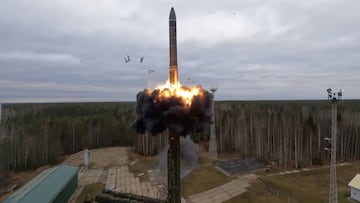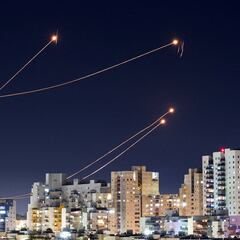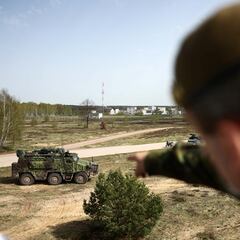What countries have the most nuclear weapons and how many does Iran have?
Despite reports of the Iranian government planning to build a nuclear arsenal, there is no evidence that the nation has been successful.


The US detonated the first nuclear bombs over Hiroshima and Nagasaki in 1945, killing up to 146,000 people. Though the weapon has not been used in a combat or terror role since, nations have continued developing and stockpiling the destructive weapons.
However, only a handful of countries possess nuclear weapons. These are:
- Russia
- United States
- China
- France
- United Kingdom
- Pakistan
- India
- Israel (undeclared)
- North Korea (unclear)
Russia holds the top spot with an estimated stockpile of around 5,997 nuclear warheads while the United States follows closely behind with approximately 5,428 nuclear weapons. These two countries alone hold roughly 90% of the world’s total estimated nuclear arsenal of nearly 13,080 warheads according to the International Campaign to Abolish Nuclear Weapons.
What would happen if a nuclear bomb dropped in your city? Learn more from leading experts at the upcoming #NukeEXPO.
— ICRC (@ICRC) April 12, 2024
Click here to register 👉 https://t.co/AGQIJxLhzK pic.twitter.com/dFkq5T6aLu
There are two main treaties that address preventing the spread of nuclear weapons beyond these nations. The Treaty on the Non-Proliferation of Nuclear Weapons (NPT) is the cornerstone international agreement for nuclear non-proliferation. Established in 1968, it has 191 member states. Only South Sudan, India, Israel, and Pakistan remain outside the treaty.
The second is the Treaty on the Prohibition of Nuclear Weapons (TPNW). This newer treaty, adopted in 2017 and entering into force in 2021, takes a more radical stance. It completely outlaws nuclear weapons, prohibiting their development, testing, possession, and use by member states. It has 93 signatories.
Only two nations in history have given up their nuclear arsenal: Ukraine and South Africa.
How many nuclear weapons does Iran have?
Iran has been a major point of concern regarding nuclear weapon proliferation due to its uranium enrichment program. However, Iran maintains that its program is for peaceful purposes, and international inspections haven’t revealed evidence of a weapons program so far. It currently has no nuclear weapons.
Related stories
In 2015, Iran reached the Joint Comprehensive Plan of Action (JCPOA) with world powers. This deal aimed to limit Iran’s uranium enrichment in exchange for sanctions relief. Under the JCPOA, Iran agreed to:
- Reduce its uranium stockpile significantly.
- Cap uranium enrichment levels well below weapons-grade material.
- Limit centrifuge development for enrichment.
- Allow for international inspections of its nuclear facilities.
In 2018, the US withdrew from the JCPOA under the Trump administration, re-imposing sanctions on Iran. In response, Iran gradually started exceeding the JCPOA’s enrichment limits and expanding its stockpile. No further agreement has been reached.

